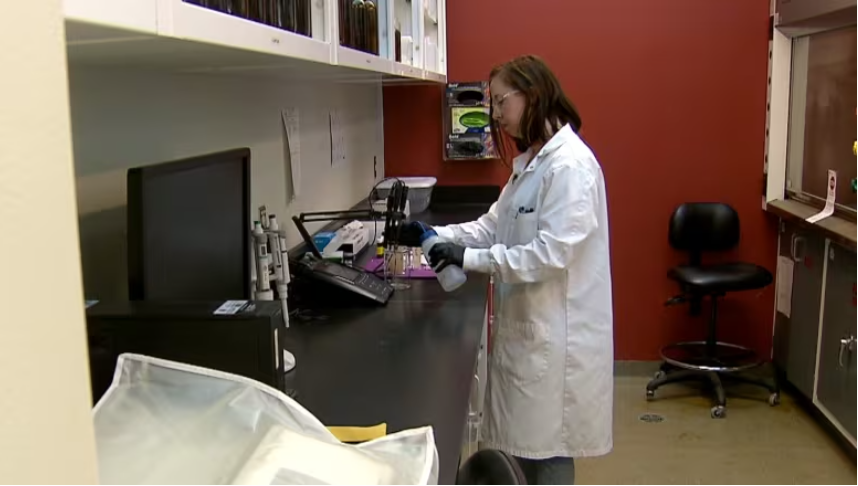The City of Calgary says it is lifting its outdoor water restrictions, but it's still asking residents to use water wisely. Officials say the restrictions, which have been in effect for two months, will be removed Tuesday. They were implemented in mid-August due to record low flows in the Bow and Elbow rivers that supply the city and other downstream communities across the Prairies.
Sewer line break in Cochrane causes discharge into Bow River
A main sewer line break occurred yesterday in the town of Cochrane, causing an overland sewage discharge that flowed into the Bow River at the Highway 22 bridge. Cochrane drinking water is not affected by the sewage and remains safe to drink. Stacy Loe is the executive director of protective and community services for Cochrane. She said the town found out about the problem at 6 p.m. on Saturday.
Summer's over, but Calgary still has water restrictions in place. Here's why
While the outdoor watering restrictions implemented in Calgary on Aug. 15 have already saved an estimated 1.1 billion litres of water, they aren't going away any time soon, say city officials. In order to get through what climate models are predicting to be a dry winter, the City of Calgary is planning to keep outdoor water restrictions in place for the time being, to prevent water stores from dropping too low come spring.
Monitoring Alberta's wastewater could help drug users avoid harm. Here's how.
A Calgary research facility that developed the most comprehensive wastewater monitoring program in the country during the COVID-19 pandemic is setting its sights on another burgeoning public health issue: illicit drug use. Advancing Canada Water Assets (ACWA), a joint initiative between the City of Calgary and the University of Calgary, is applying the same techniques it used to monitor COVID-19 case numbers to track illicit drugs in the province's wastewater.
Amid drought conditions, Calgary restricts outdoor water use for homes and businesses
Calgarians’ outdoor water use is being limited to two hours per week as the city faces continued drought conditions, officials announced Tuesday. It’s the first time the city has imposed such restrictions due to dry conditions, with water flows in the Bow River at their lowest level since 1911 and the Elbow River since 2000, said Nicole Newton, the city’s manager of natural environment and adaptation.
City of Calgary reduces water use amid drought conditions
The City of Calgary says it has moved its drought monitoring dial to dry from normal. It says the decision is based on tracking of precipitation levels, reservoirs and lake levels, stream flow rates in the rivers and water demand. "Despite the moments of intense rainfall through July, our monitoring team continues to see impacts of this year's dry conditions across Calgary and the region," Sarah Marshall, the city's water resources planner, said in a statement.
Hot and dry summer could affect Calgary's water levels
The beginning of June in Calgary has been hot and dry, and that could have an affect on the city’s water supply through summer. Environment Canada and Climate Change Canada (ECCC) says Calgary has come into the summer season with dryer than normal conditions — spring 2023 ended as the fifth driest spring on record.
7 water main breaks in a single day keep Calgary crews busy
January is typically the busiest month for water main breaks in Calgary, but this week more than usual have occurred. On Thursday, the city's website showed 12 broken water mains, seven of which ruptured Wednesday. "That's abnormal," said Lee Dupras, leader of repair and maintenance for drinking water distribution at the City of Calgary. "I have not seen that many in one day come in since I've been in this [department] of the city."
Strathmore left out of Calgary fluoride debate
Despite receiving its water from Calgary through a regional system, Strathmore has been left out of discussions about reintroducing fluoride to the city’s potable water. In 2011, Calgary water fluoridation was discontinued. But in 2019, the City of Calgary started discussions about adding fluoride to the city’s water supply once again. A report to Calgary city council was presented on Dec. 14, 2020, stating that adding fluoride to the water supply would cost about $30 million over two decades, including about $10.1 million in capital expenses, about $1 million per year in operating and maintenance costs, and about $2 million to $4 million in upgrades over that period. The report stated an associated change in water utility rates or service levels are not anticipated, though this is not guaranteed.
City of Calgary cancels annual mail-outs, testing for lead in water due to COVID-19
She was surprised to find out her home had a public lead service line (LSL) delivering water from the city’s water mains — especially because she was pregnant while living there. “I freaked out,” Cohen says. “I called the city immediately, and I think they actually told me that they weren’t even sure if they could check our pipes, because I think it was the end of their cycle.”











